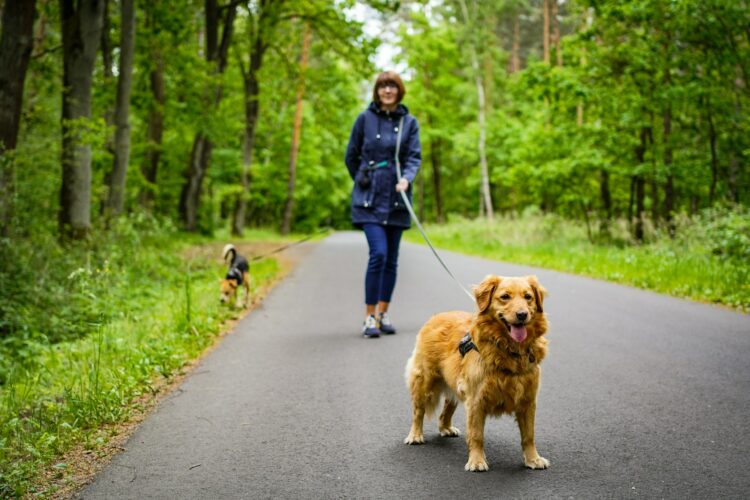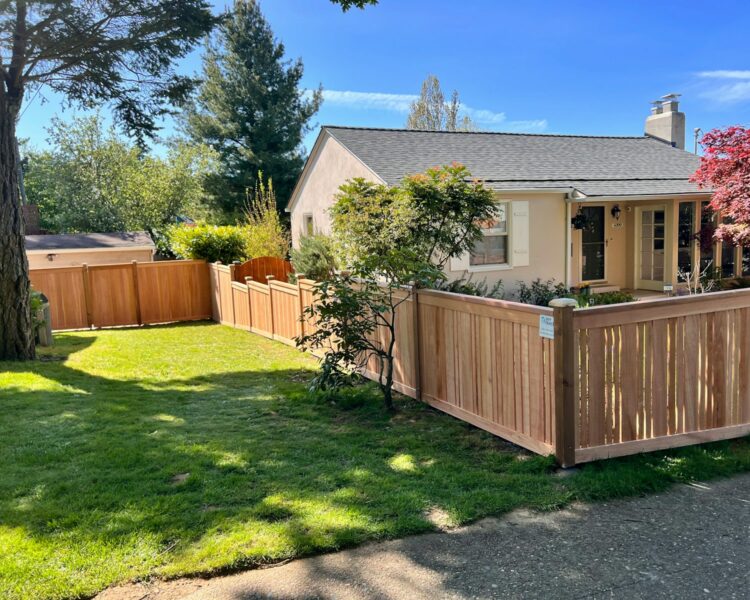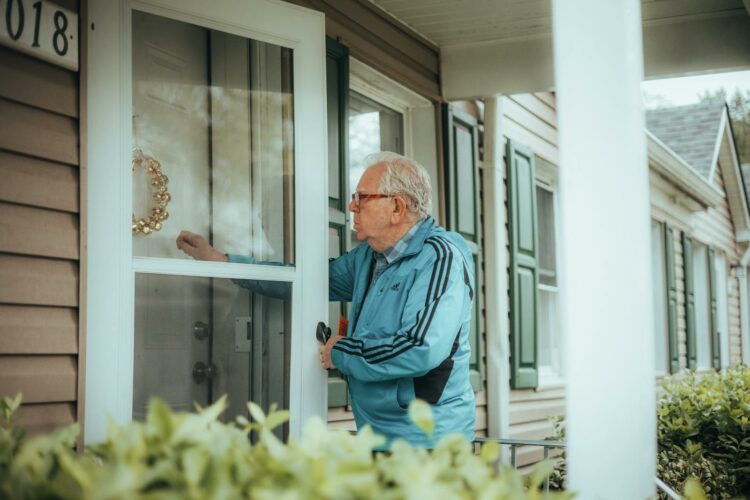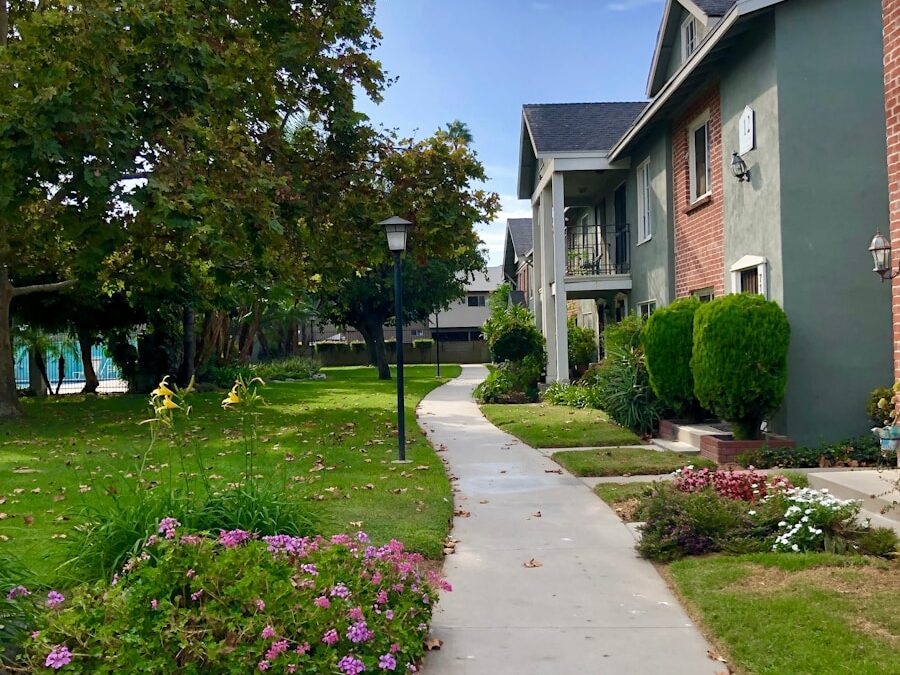
Neighborhoods have changed a lot over the years. The times when everyone on your street knew each other and waved hello as you walked by are fading away. These shifts have changed the unspoken rules of being a good neighbor. Whether you’re new to the area or have lived in the same place for 20 years—here are 15 essential neighborly etiquette rules you should keep in mind.
Always say hello when you see your neighbors.

You don’t even need to say anything. A simple smile or wave can make a big impact. It’s a great way to show your neighbors that they matter to you. Just be sure that a casual hello stays just that. Don’t be super nosy about what they’re doing or what’s going on in their lives. Some people prefer not to talk about these things, so respect their choice.
Send a quick text before dropping by.

This is so annoying. Many people are bothered by guests who drop by without an invitation. To be a good neighbor, try to send a text before your visit. This also goes for kids’ playdates—don’t let your child be the one who shows up unannounced at some other person’s home. Always call ahead for these visits.
Talk to your neighbors first if there’s an issue.

Is your neighbor’s super loud music keeping you up at night? Are their kids bothering your dog? Talk to them. Having an in-person conversation can be intimidating, especially if you have to bring up something your neighbor might not want to hear, but discussing things face-to-face should be your first approach.
Have a neighborhood safety plan in place.

Wildfires, earthquakes, floods, hurricanes—you never know what might happen these days. If you ever find yourself in an emergency, your neighbors will be the first people you turn to for help. That’s why creating a safety plan with them is so important. It can be as simple as printing a map and marking where people who may need assistance, like older people, are located, or as involved as setting up a neighborhood watch program and more.
Keep your security cameras on your own property.

As crime rates rise and video equipment becomes more affordable, it’s pretty common to see cameras appearing on houses in your neighborhood. If you decide to go ahead and install your own, where exactly should those cameras be pointed? Is it a big deal if your front porch camera also records your neighbor’s front yard? Yes, it is a very big deal. You should keep your video surveillance strictly on your property.
Offer help instead of judging your neighbors.

Does your elderly neighbor have a messy yard? Does the single mom next door often leave her garbage cans out? Are the kids acting up at the bus stop? Instead of gossiping or whining—reach out and see if there’s a way you can help. For example, you could mow your neighbor’s lawn, bring her trash cans in when you take yours, or just keep an eye on the kids till the bus arrives.
Clean up after your dog.

Leaving dog poop in public spaces or in someone else’s yard is just plain disrespectful. It’s not only inconsiderate, but it’s also pretty disgusting—dog waste can spread diseases, harm plants, and grass, and let’s face it, the smell is far from anything nice. Good neighbors know it’s their duty as pet owners to clean up after their pets.
Give your neighbors the benefit of the doubt.

Does the neighbor across the street practice a “strange” religion? Does the guy next door roll around in a big white van? Rather than assuming your neighbors are hoodlums, terrorists, or serial killers, try giving them the benefit of the doubt. This doesn’t mean you should overlook bad behavior or put yourself in risky situations; it just means recognizing people as individuals first and considering other possible explanations for their actions beyond the negative ones.
Learn your neighbors’ names.

You’d be surprised how many people have lived next to someone for years and know nothing about them. Good neighbors take the time to learn each other’s names and a few details—like how long they’ve lived in the area, where they work, or if they have kids or pets. Remember that neighbors who know each other are more likely to look out for one another.
Set clear boundaries with fences.

“Good fences make good neighbors” isn’t just a catchy Instagram quote; it’s solid advice. Having the right boundaries—both physical and personal—can prevent many common neighbor disputes. It’s perfectly okay to say no sometimes. Saying yes to everything your neighbors ask can lead to resentment and exhaustion, which will likely hurt your relationship in the long run.
Avoid social media arguments with neighbors.

Keyboard warriors are everywhere nowadays, using neighborhood apps and social media groups to vent about everything from politics to teens trick-or-treating to dog poop. While this might earn you some support—it doesn’t really help solve the problem and just paints you as a complainer. So, avoid fighting on social media with your neighbors. You should call the cops if you face a bigger issue.
Respond to invitations right away.

If your neighbor is nice enough to invite you to their picnic, birthday party, graduation party, game night, or any other event, you should be kind enough to respond quickly. Sadly, it’s super common these days for people to either not RSVP at all or to delay their response, waiting to see who else is coming first. This just makes it tough on the hosts.
Keep things positive in neighborhood groups.

Neighborhood apps and community message boards have taken the place of the backyard fence from days gone by, becoming the primary way neighbors share information. These can be useful tools as long as you remember to keep your manners in check online. The whole point of these groups is to promote community and camaraderie, so make sure your posts and comments are positive and productive.
Use polite manners with your neighbors.

We often save our best manners for people we want to impress, like a boss or a potential partner, and let them slip when we’re at home. While being more relaxed with your neighbors than your coworkers is okay, you should always be polite. This means saying “please,” “thank you,” “excuse me,” and other polite phrases.
Respect the neighborhood rules.

Many conflicts between neighbors begin with disagreements over rules and whether someone is following them or not. Most of these can be avoided by simply doing your best to stick to the standards set by your neighborhood. Whether it’s taking down holiday decorations by the end of January or keeping your garbage cans out of sight—these are things your neighbors have decided are super important, so you should make a good-faith effort to follow them.

